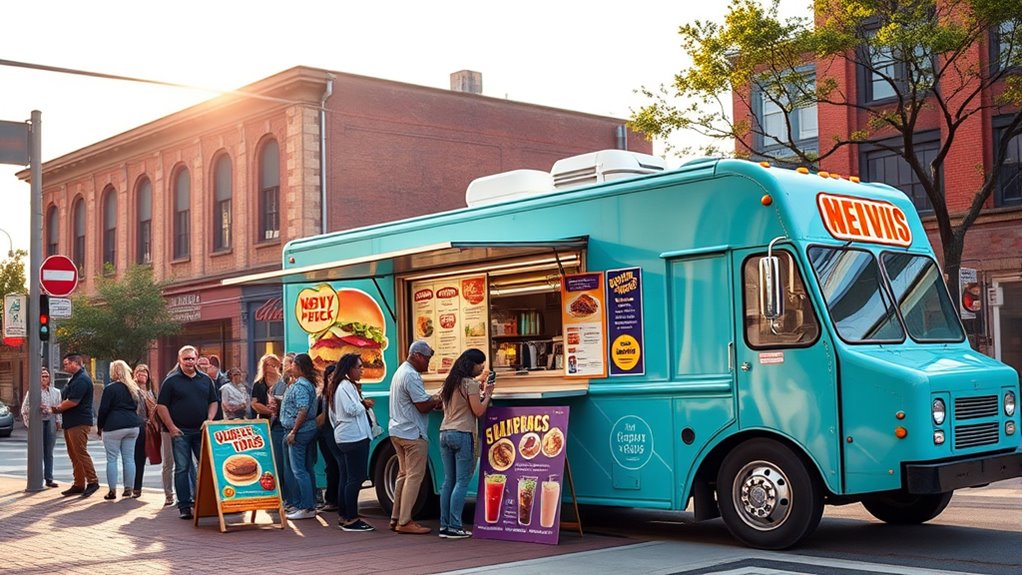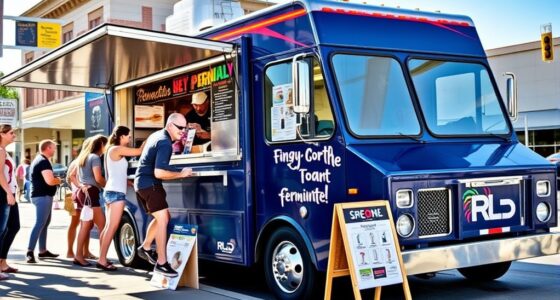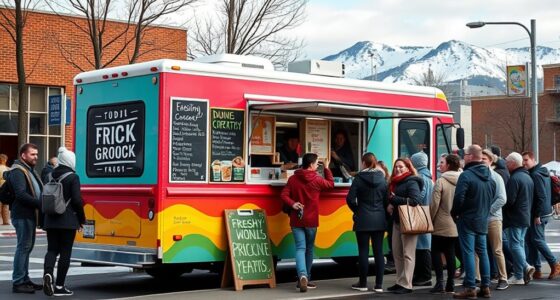To open a food truck in Little Rock, Arkansas, you need to secure permits from the Arkansas Department of Health, including health, fire, and business licenses, which can cost from $50 to over $500 annually. Choose high-traffic locations like downtown or event venues, and develop a menu that complies with safety regulations and highlights local flavors. Effective marketing involves social media, community engagement, and loyalty programs. If you continue exploring, you’ll find tips to keep your business compliant and thriving.
Key Takeaways
- Obtain permits from Arkansas Department of Health, including detailed plans, SOPs, and equipment info, with fees ranging from $50 to $500.
- Secure location approval on private property or high-traffic public areas, considering zoning laws, parking, and noise regulations.
- Develop a compliant menu featuring temperature-controlled items, local flavors, allergen info, and culturally relevant options.
- Build brand awareness through social media, community events, loyalty programs, and partnerships with local businesses.
- Prepare for inspections by scheduling ahead, maintaining proper vehicle safety, sanitation standards, and documenting all permits and licenses.
Navigating Permit Requirements and Fees in Arkansas
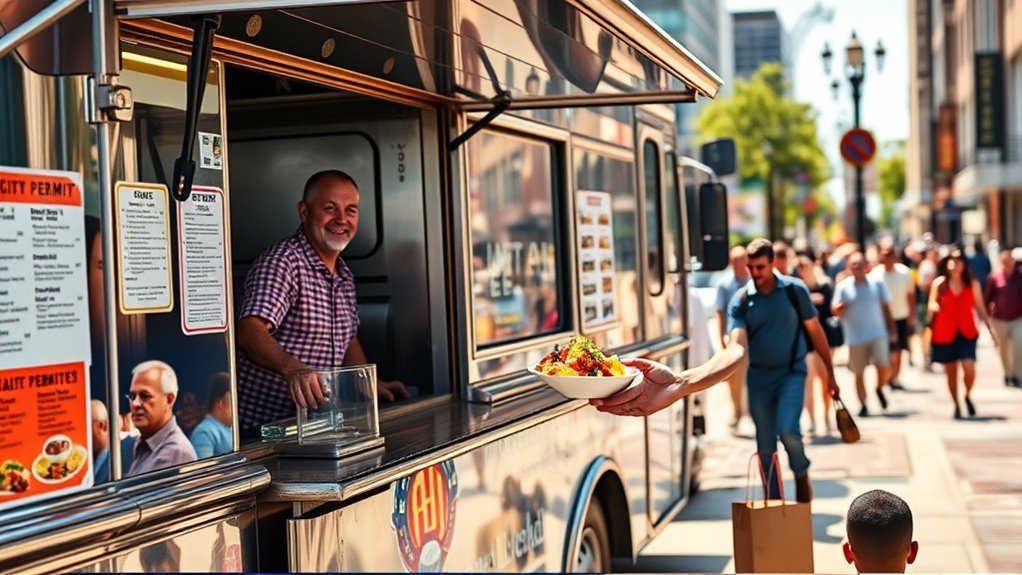
Understanding permit requirements and fees for food trucks in Arkansas can seem complex, but understanding the key steps makes the process manageable. First, you need a permit from the Arkansas Department of Health if your truck sells temperature-controlled food to ensure safety. You’ll pay a plan review fee ranging from $50 to $500, based on 1% of your facility’s estimated cost. Once approved and operational, an annual permit fee of $35 applies. You must submit detailed kitchen plans, including menus, SOPs, and equipment, along with plumbing reviews. In North Little Rock, you’ll need additional permits, like a business license, fire and health inspections, and an A&P permit. These permits typically last one year and require compliance with local noise, trash, and parking regulations. Additionally, you should be aware that permits may require renewal and ongoing compliance checks to remain valid, especially as local regulations may change over time.
Finding the Perfect Spot: Location Options for Food Trucks
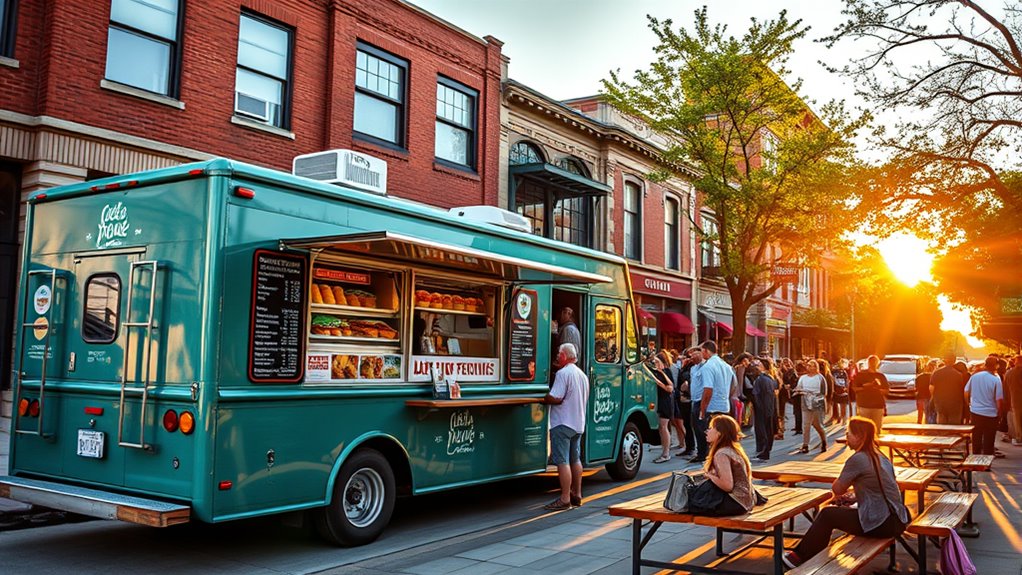
You need to choose strategic locations that maximize your sales potential, like private properties with permission, public event venues, or busy high-traffic areas. Each spot offers unique advantages, whether it’s steady foot traffic or special event crowds. By selecting the right location, you’ll boost visibility and attract more customers. Additionally, securing the proper permits and permissions is essential to avoid legal issues and ensure smooth operations.
Private Property Permissions
Finding the perfect spot for your food truck in Little Rock involves securing private property permissions, which requires clear communication with property owners and city authorities. You’ll need written permission from the property owner and approval from the city to operate legally. This permit often involves an initial fee, such as $200, with annual renewals costing around $50. You must submit proof of health and fire safety inspections, business licensing, and liability insurance, typically $1 million coverage listing the city as an additional insured. Your site plan should specify the exact location, with site owner consent. Ensure compliance with zoning laws—food trucks usually operate in commercial or industrial zones—and adhere to restrictions like distance from residential areas and noise ordinances. Additionally, private property permissions are essential for avoiding legal issues and ensuring a smooth operation. Understanding local zoning laws can help you select the best site and prevent future compliance issues.
Public Event Venues
Public event venues in Little Rock offer prime opportunities for food trucks to reach large audiences and boost visibility. Events like the Downtown Little Rock Food Truck Festival draw over 35,000 attendees, featuring 70+ trucks, live music, and vendor booths. Regular gatherings such as Food Truck Fridays at War Memorial Park and the Food Truck Stop at Station 801 provide consistent exposure. These venues often have amenities like parking, restrooms, WiFi, and entertainment, making them ideal for attracting customers. Utilizing self watering plant pots can serve as an innovative way to incorporate sustainable practices into your food truck’s environmental efforts.
High-Traffic Areas
High-traffic areas are essential for maximizing a food truck’s visibility and sales in Little Rock. Prime corridors like Capitol Avenue in Downtown Little Rock attract over 30,000 people during major events, offering high exposure. Main streets with dense pedestrian and vehicle flow encourage spontaneous stops, especially near retail centers and office buildings where daytime workers seek quick meals. Proximity to shopping centers helps access established customer bases. Near educational institutions like the University of Arkansas at Little Rock, you can target students and staff with quick, affordable options during campus events and daily routines. Entertainment districts, parks, and recreational areas draw weekend and holiday crowds, while mixed-use developments and transit hubs provide steady foot traffic throughout the day. Securing visible spots with ample parking boosts your chances of success. Understanding location options and their foot traffic patterns can significantly influence your truck’s success and customer reach.
Crafting a Compliant and Appealing Menu
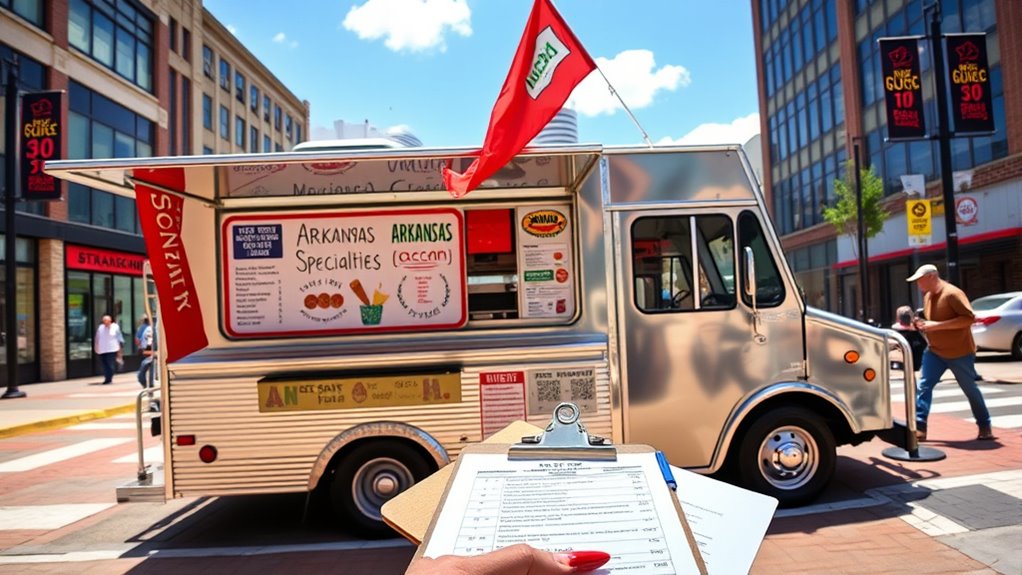
When creating your menu, make certain all items meet Arkansas food safety regulations, especially those needing temperature control. You’ll need to submit your menu for approval and develop SOPs to ensure proper handling and storage. Keeping your menu honest, simple, and compliant helps you serve safe, appealing food and avoid regulatory issues. Additionally, understanding the importance of espionage tactics can help you stay vigilant about security measures in your operation.
Menu Item Regulations
Have you considered how to craft a menu that’s both compliant with Arkansas regulations and appealing to customers? Your menu must clearly list all ingredients, especially allergens like peanuts, dairy, gluten, and shellfish, to meet health standards. You’ll need to disclose additives or preservatives if relevant. Regular updates are essential when recipes or suppliers change. Ensuring menu clarity and transparency not only complies with regulations but also builds customer trust.
Temperature Control Compliance
Ensuring your menu complies with temperature control standards is essential for food safety and customer trust. You must keep potentially hazardous foods at 41°F or below or 135°F or above at all times to prevent bacterial growth. You should also be aware that food spoilage indicators such as off-smell, discoloration, and separation can signal unsafe conditions, so regular checks are vital. Frozen foods should be stored at 0°F or below, except during defrosting or brief loading periods. Hot and cold holding units must reliably maintain safe temperatures during service. Regularly monitor and document food temperatures to guarantee compliance. Use proper packaging for transport, avoiding nondurable containers for ready-to-eat TCS foods. Your truck’s refrigeration and heating equipment must meet Arkansas Department of Health standards, and menu items requiring temperature control should be planned around your equipment’s capabilities. Follow these practices to keep food safe and meet regulatory requirements. Maintaining proper temperature logs is also critical for inspections and ensuring ongoing compliance.
Strategies for Effective Marketing and Community Engagement
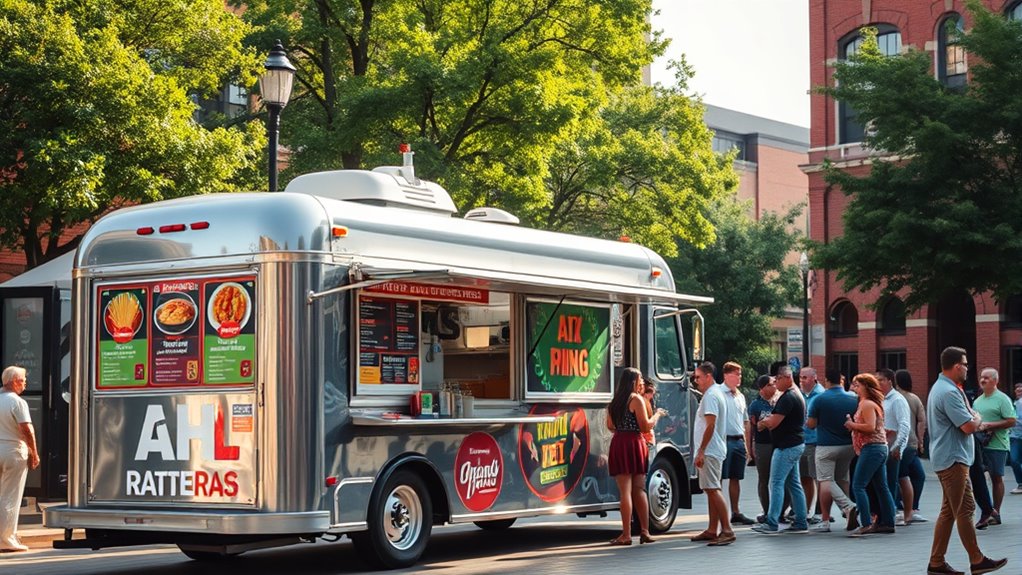
Effective marketing and community engagement are essential for your food truck’s success in Little Rock. Start by crafting a distinctive brand identity with eye-catching truck design, logos, and packaging that resonate with your target audience. Share an authentic story about your truck’s origins and values, and consistently weave this narrative into social media, menus, and marketing materials to build emotional connections. Partner with local businesses, participate in community events, and sponsor charity functions to boost visibility. Use high-quality flyers and posters for offline promotion, and maintain active social media profiles with engaging content, contests, and localized SEO. Implement a loyalty program and offer digital coupons to encourage repeat visits. Understanding Your Market is crucial—targeting a younger demographic that values convenience and innovation can significantly increase patronage. Additionally, understanding the importance of juice cleansing and detox can help you incorporate health-conscious options into your menu, appealing to health-aware customers. By reflecting local culture and sustainability, you’ll foster loyalty and deepen your community ties.
Preparing for Inspections and Ensuring Regulatory Compliance
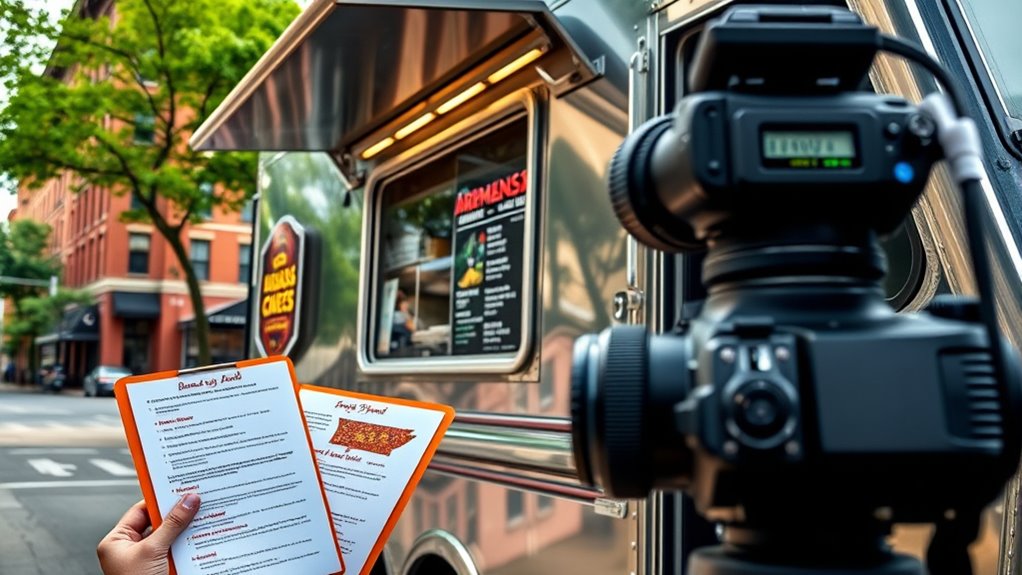
Preparing for inspections starts well before the scheduled appointment; staying organized and proactive guarantees your food truck remains compliant with all regulations. You should schedule inspections in advance by contacting the relevant departments—fire, health, and fire safety—since no virtual or after-hours inspections are allowed. Ensure your truck meets all safety and sanitation standards, including proper equipment, temperature controls, and secure documentation of permits and licenses. Maintain your vehicle’s sanitation, safety equipment, and operational readiness at all times. Conduct internal audits and staff training to minimize violations. Keep updated records of permits, inspection reports, and property permissions accessible during inspections. Regularly review compliance requirements for health and fire codes to stay ahead of potential issues and ensure smooth, hassle-free inspections. Scheduling inspections in advance helps avoid last-minute issues and ensures all necessary preparations are completed. Being familiar with regulatory requirements can streamline the inspection process and help prevent unexpected violations.
Additional Tips for a Successful Food Truck Business
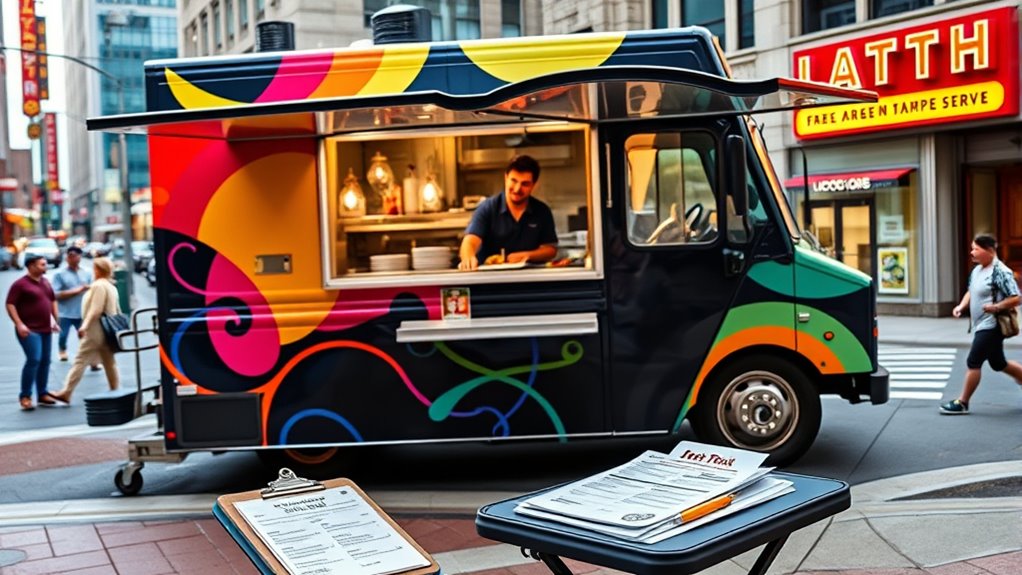
Building a loyal customer base is key to sustaining and growing your food truck business. You should establish a strong social media presence on local platforms to engage customers and boost brand recognition. Use email newsletters to share updates on locations, menu specials, and promos. Creating loyalty programs encourages repeat visits and increases customer lifetime value. Gather feedback and use it to improve service and menu options, fostering a customer-centric approach. Hosting or participating in community events enhances visibility and goodwill. Regularly analyze sales data to identify top-selling and high-margin items, then streamline your menu to focus on these. Introduce seasonal offerings to keep things fresh and motivate repeat visits. Ultimately, diversify revenue through catering, online ordering, and partnerships to maximize growth opportunities.
Frequently Asked Questions
How Long Does the Permit Approval Process Typically Take?
You’re probably wondering how long it takes for your permit to get approved. Typically, standard vendor permits process within 10-15 business days, but health department approvals can take 3-4 weeks. Special event permits need at least 30 days’ notice. To prevent delays, make sure your application is complete and responds promptly to any city requests. Planning ahead helps ensure a smoother, faster approval process.
Are There Specific Insurance Requirements for Food Trucks in Little Rock?
You might think insurance is optional, but in Little Rock, it’s mandatory for food trucks. You need commercial auto insurance with liability coverage, typically around $190 a month, and general liability insurance of at least $1 million, with the city listed as an additional insured. Plus, consider property and workers’ compensation coverage. Proper insurance protects you from costly claims and keeps your business compliant with local regulations.
Can I Operate a Food Truck in Multiple Cities With One Permit?
You can’t operate a food truck in multiple cities with just one permit. Each city or municipality has its own rules, requiring you to apply separately for permits, health inspections, and other approvals. You’ll need to gather local permits for each area, like Little Rock, and coordinate inspections accordingly. Budget for multiple fees and guarantee you meet all local requirements to stay compliant and avoid penalties.
What Are the Parking Restrictions for Food Trucks in Little Rock?
You need to follow Little Rock’s parking rules for food trucks. Park only in designated or legal areas, avoiding meters or restricted zones. Never block fire hydrants, entrances, or sidewalks. You can’t park in front of restaurants without permission, and parking on private property requires owner approval. Limit parking to 12 hours on private sites and adhere to city permits. Violating these rules can lead to fines, towing, or permit revocation.
How Often Do Food Truck Permits Need Renewal or Updates?
Like a clock ticking steadily, your food truck permit in Little Rock needs annual renewal, keeping your business in sync with local rules. You should submit your renewal at least 30 days before it expires, ensuring all documents, insurance, and health inspections are current. Missing this deadline could halt your operations, so stay organized with reminders and be prepared for possible additional inspections during the renewal process.
Conclusion
Starting your food truck in Little Rock is more than just serving good food—it’s about steering permits, choosing the right location, and marketing smartly. Believe it or not, some say food trucks only succeed if they follow the rules perfectly, but flexibility and community engagement often matter just as much. With careful planning and passion, you can turn your food truck dream into a thriving local staple—so get ready to roll!
